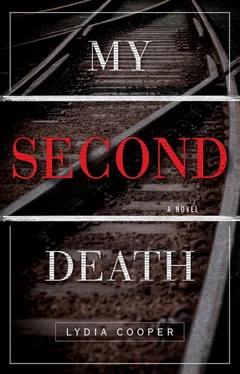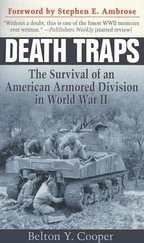“I know.”
He smiles. The pads of flesh over his cheekbones press his eyes into squints. He leads me down scuffed linoleum corridors to the wide industrial metal-sided doors that open into the parking deck.
He drives me back to the apartment and opens the door for me like a gentleman. “You take care. Okay?”
“Yes.” My palms are wet. My head starts to hurt. My act of innocence, my masterful performance, sweeps over me in a tide of shaking and cold sweat. “You too. Thank you.”
“Yeah,” he says. “Anytime. Be good.”
Aidan gets up from the couch when I come in. He comes quickly into the kitchen and stands in front of me.
“You okay?”
“Yes.” I go over to the kitchen sink and run the tap. Wait for the water to heat. I pour lemon-scented dish soap into my palms and scrub my hands into a froth of bubbles. I wash my arms up to the elbows. The lingering smell of ammonia and blood. My hands feel alien, as if they belong to some other body.
“What was — what did they want to know? What did they, did they ask you questions?”
I turn off the tap. Look over at him. My hands drip into the sink.
“They asked me why I ran into the apartment. If I knew her. If I killed her. I answered them. They let me go. Do you want to ask? You want my answers? What will you do then?”
He looks at me, his upper lip drawn taut against his teeth.
“What does it matter to you? Whatever I say, what does it matter? The only thing that can change is what you believe. So what do you think? Did I do it? Am I a fucking killer? Did I do it?”
He inhales. He looks at me for a long time. And then he shakes his head once and goes into his room. His door shuts.
The apartment is dark and cold. I feel for the light switch. The room smells of Jack Daniel’s. The thermostat is set to fifty degrees Fahrenheit.
An easel sits in the kitchen. The wet paint catches at the light, dark orange and pale yellow dabs dissolving and mingling. I can’t tell what image struggles through the rush of paint strokes on the canvas. The silence is frenetic.
I go into my room and empty my backpack of the contents, laptop, Bic pens, loose-leaf notepaper scribbled with library call numbers and notes in various archaic languages. I take the laptop into the living room. A newspaper lies on the couch. I move it to sit down, then see the date on the paper. I set the laptop on the worn carpet and open the newspaper. The mutilated body found near the university campus has been identified. The victim was an indigent woman named Desiree Morehead, fifty-two years old, of no known address and with no living relatives. Forensic evidence suggests she was killed elsewhere and brought to the house. The location of the murder is unknown but is likely to be nearby. No information is available on how she got into the house or who killed her. The apartment’s inhabitant had an alibi and did not recognize the body. The police are soliciting information from any person who may have seen someone entering the premises that day, any person who may have been in the vicinity, hanging around or acting otherwise suspicious, in the days leading up to the murder.
My parents called this morning. My mother couldn’t believe that something like that would happen and I wouldn’t call her immediately. Didn’t I know that she worries ?
I didn’t tell her about my foray into the bowels of the Akron Police Department last night. And she never asked about the woman, if I knew her. I don’t know if she is afraid to know the answer or if it just doesn’t occur to her to wonder.
For a long time I sit on the couch and try to feel something — anger, maybe. A clean rage. Or fear. But the numbness that feels like cotton in my veins instead of blood is different from my usual disinterest in other people. It’s a colder feeling, like a sickness in my belly. I sit with my hands pressed between my knees and wonder if something broke in me when I saw her. I can’t remember how she looked when she was alive, the shapes of her face, the color of her eyes, or how she smelled.
And I refuse to think about her dead.
I fold the newspaper up and put it in the recycle bin. I work in the living room for three hours. Aidan does not come home. His painting dries unfinished.
My roommate, for the first time in our brief acquaintance, does not seek me out, does not talk, does not say anything and especially does not ask what he does not want to have answered. I come home each night to a silvery mist of non-words with absences and non-meanings between them, pulsating, breathing, a shivering fabric of nothingness.
I research online. I sit in the university library and read ancient books and trawl through less ancient databases. I read archaic lexicons and memorize morphemes.
I come home to the silence. I call my brother but he hasn’t answered his phone since my evening in police custody. I sit on my bed and read and try not to listen to Aidan’s cramped silences. I try not to think of all the decisions that have led me to this place, try not to think about the fact that there is nothing that I can do to make my brain chemicals different.
Downstairs the apartment has been cleaned and evacuated. Another red and blue RE/MAX sign sits out front, this time for the apartment below. Melting snow softens the soil and the last shards of broken glass sink deep into the earth. The temperature creeps above thirty-five degrees.
The air smells like spring but it’s a lie. Winter hovers over Lake Erie, waiting. Those of us born in this state live with the smell of freshening earth but believe only in that unseen slavering icy predator to the north.
I run in the melting snow and get a head cold.
My mother calls again. The family makes an annual pilgrimage to Michigan for the Thanksgiving holiday. I usually decline, but my mother is strangely insistent this year. She says she is worried about me, worried about how dangerous my neighborhood is. But there is something else that worries her. I can’t tell what it is, only that her voice is strung like a violin string on the point of snapping.
The Chevelle’s exhaust system breaks with a roar like a wounded dragon. In the distance between the apartment and my parents’ garage no less than three cars speed pass me with a middle finger on display in the driver’s window. I spend most of Saturday on my back on ice-crusted gravel trying to figure out if I can remove the muffler and have the crack welded, or if I need to replace the whole thing.
My mother brings me hot cocoa, and stands under the carport and asks if I’m coming with them.
I wipe at grease crusted over my chin and say, “Okay.”
She nods a few times. But she doesn’t leave. She just folds her arms under her breasts and watches me. Her breath is visible in the chill.
Because the Chevelle is still up on cinderblocks at my parents’ house, I climb into the family car for a seven-hour trip to the grandparents’ house. My family always makes it a four-day adventure, full, I am sure, of familial warmth and gastronomical delight. I stopped going a few years after I moved into my parents’ garage.
I sit on a bench seat in my mother’s minivan, trying to read history textbooks while Stephen crunches on peanut butter crackers in the seat ahead of me and my parents sit silently in their respective seats up front.
My grandparents’ Michigan housing development, built in the late seventies, is all brown siding and ugly brickwork. Snow packed around blackened trees, stunted houses on frozen lawns. Thick glassy icicles fringe my grandparents’ eaves. Stephen runs up to the front porch and jumps and knocks his red mittens against the icicles. They crack and shatter into the snow, a fine dust of ice shards puffing up like the detritus after a small explosion.
Читать дальше












